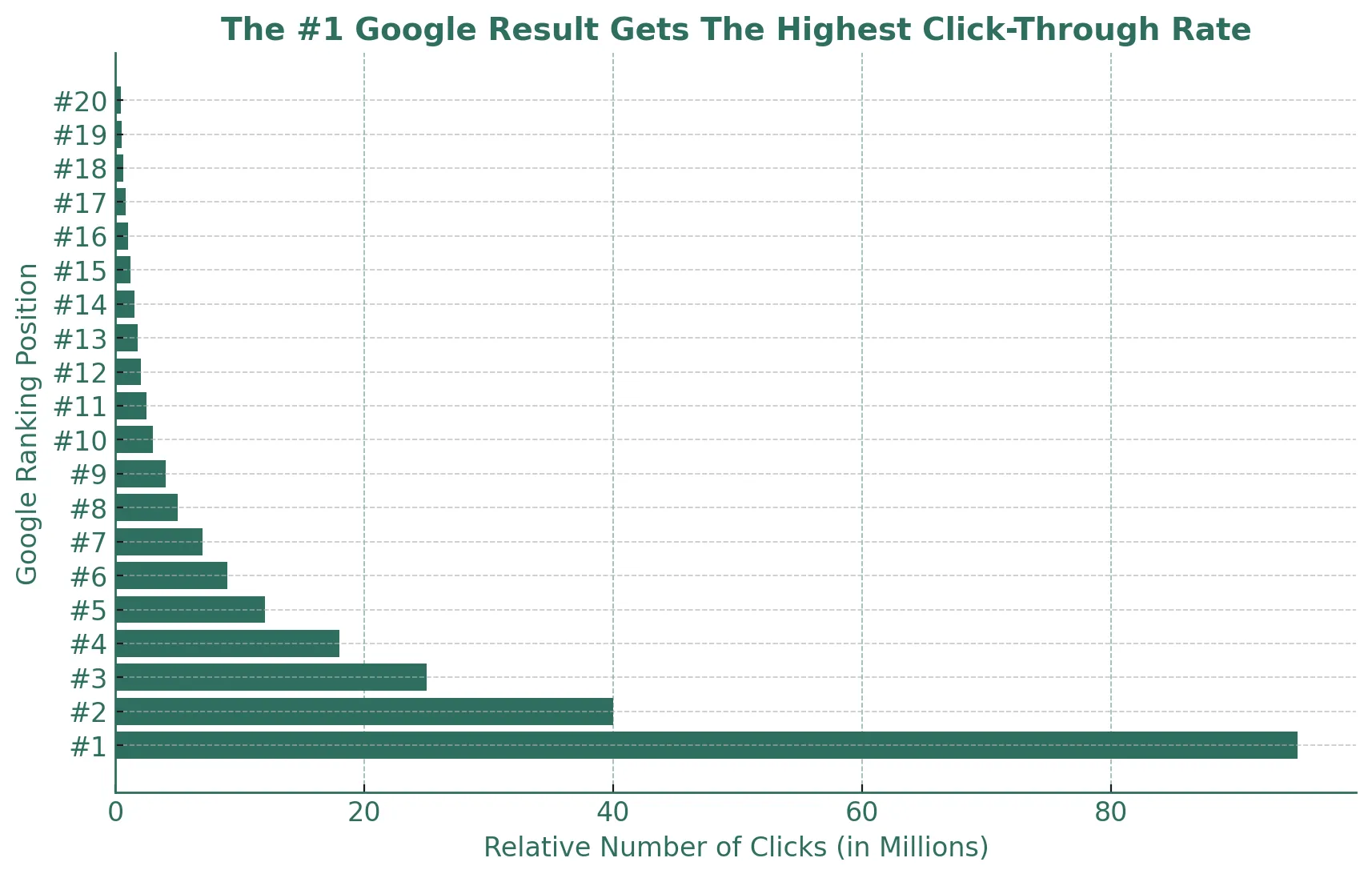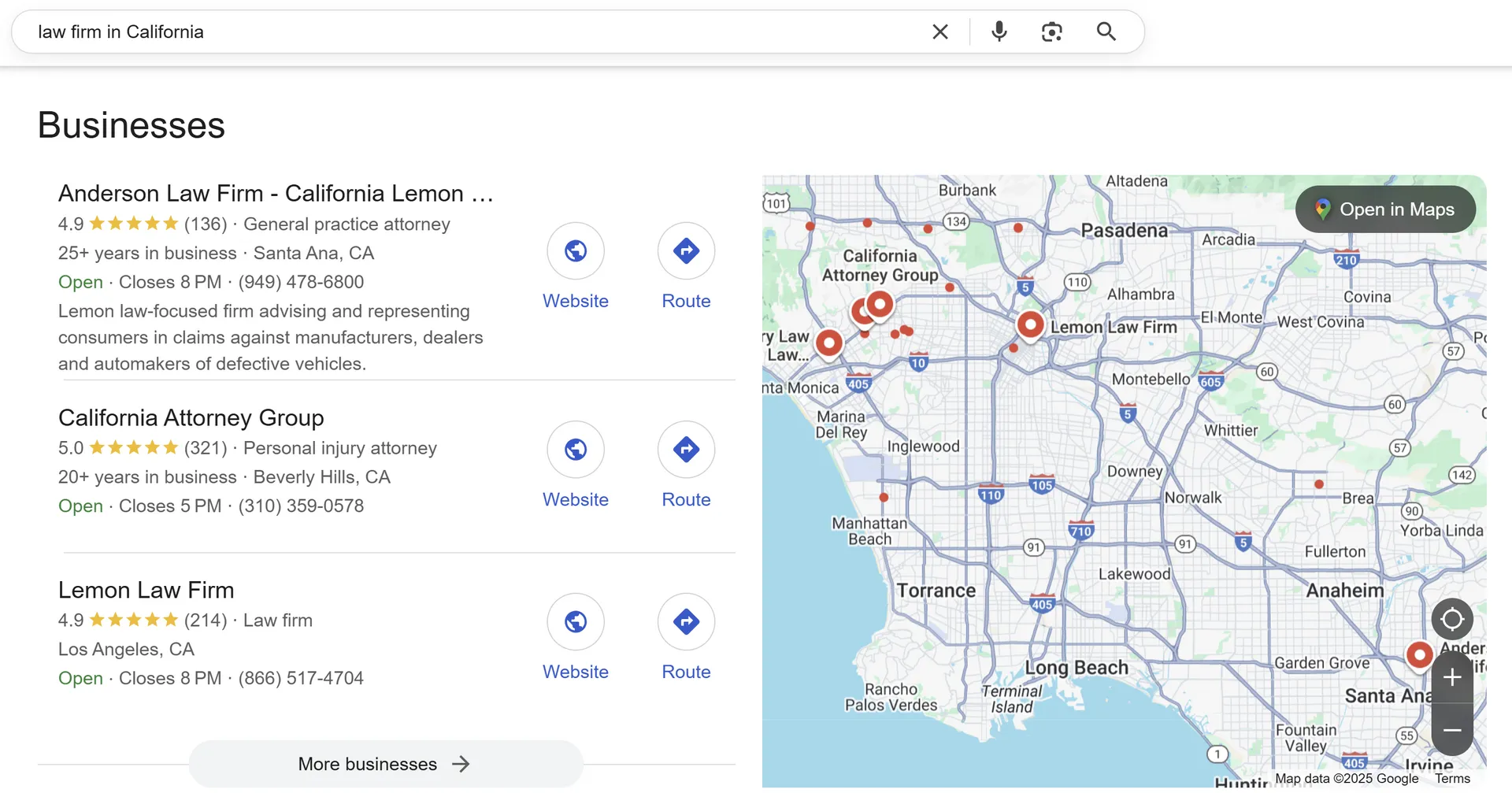For most potential clients, the search for a lawyer begins online. Whether someone is seeking services for personal injury, divorce, a complex business issue or a nasty neighbor dispute, their first instinct is to open their favorite browser and type “best lawyer near me.” If your law firm doesn’t appear in those search results, it’s likely you may never even be considered.
Simply put: In the age of the internet, SEO for today’s law firms is a necessity. The real question is how to structure your SEO efforts. Do you build an in-house team? Outsource to an agency? Or perhaps a combination of both?
This article will walk you through all of the potential options and provide you with all of the information that you need to make the best decision for your firm.
Why SEO Matters for Small Law Firms
Did you know that according to 2025 Data, the top three organic (meaning non-ad) results on Google Search absorb roughly 68.7% of all traffic? That means if you aren’t investing in SEO to rank in the top results, you’re chopping your firm’s online visibility by nearly 70%.
Here’s the breakdown:
In addition to visibility, Google results matter because they serve as a form of digital trust. A strong position in search results suggests authority, reliability and relevance. For small law firms competing with larger practices, visibility in search results can help level the playing field. Local search is especially crucial: features like Google Business profiles, local citations and star ratings in reviews can heavily influence whether a potential client calls your office or clicks on a competitor.
Neglecting SEO is more costly than many firms realize. Every missed website visitor represents a missed opportunity for an introduction that ultimately leads to revenue. The cost of being un-findable online is measured not just in lost leads, but the perception that your firm isn’t a serious player in the local legal market.
What Is In-House SEO?
In-house SEO means that your law firm hires dedicated staff whose primary role is to manage your search strategy. This could be a marketing coordinator who dabbles in SEO and other marketing activities or a full-time SEO specialist. For medium-large firms, a small team of individuals specialized in their niche may be more common.
Advantages of In-House SEO
The advantages of an in-house SEO professional is that they will work exclusively for your firm. They’re plugged directly into your team of attorneys and staff and are more aware of case trends, outcomes and the industry at large. This direct integration shortens communication loops allowing for faster content updates, blog posts and reputation management.
Challenges of In-House SEO
However, in-house SEO comes with challenges. Salary expectations for skilled SEO professionals range from $45,000–$75,000 depending on experience and location. Beyond salaries, overhead such as benefits, office space and equipment, and necessary tools can quickly add up. Recruiting and retaining skilled SEO talent is often a hurdle as many may lean towards employment with an agency where they are exposed to multiple industries and have more opportunity for upward career growth. Lastly, because in-house staff are focused solely on one firm they may lack exposure to broader search strategies and trends.
For small law firms, deciding to build an in-house SEO team is a commitment that makes sense only when you have the budget and a long-term vision.
What Is Agency SEO?
Agency SEO refers to outsourcing your law firm’s SEO strategy to a third-party company that specializes in search optimization. Agencies typically offer a wide range of SEO services: technical website optimization, content development, keyword/on-page strategy, link building and local SEO. Many are structured to provide a reporting dashboard and a dedicated strategist, so that you can track progress and meet often with your point of contact.
Advantages of Agency SEO
The advantages of working with an agency is access to a team of experts who specialize in different SEO disciplines. Instead of one individual who may be a “wearer of many hats” but lacks deep expertise, an agency comes with strategists, technical specialists, writers and analytics pros working together. Agencies also bring scalability; the ability to ramp up quickly, adjust resources as needed, and perhaps expand into new markets. Maybe most importantly, agencies are often more cost-effective for small firms compared to hiring a full-time in-house SEO team. For the cost of one mid-level employee, you can often get an entire team of specialists.
Challenges of Agency SEO
Agencies don’t come without their own challenges, however. While they can ramp up quickly to the overall industry, they don’t integrate with your firm’s culture daily. Communication is generally via standing weekly calls and ad-hoc emails which get responded to in the order they arrive amongst other clients.
Additionally, SEO takes time and if you have a team executing on a strategy that you may not totally understand or be plugged into it can feel like you’re paying for reports instead of results – which is why expectations and alignment are critical upfront. Last, not all agencies are created equal and it’s crucial to take the agency vetting process seriously.
Be wary of agencies touting suspicious growth results as these could be achieved by using “black hat” SEO tactics to deceptively boost metrics. This approach could end up severely hurting your long term SEO strategy, or worse, getting your entire domain blacklisted by Google.
Still, for many small firms, agencies provide the expertise and cost balance that makes SEO possible.
Cost Comparison: In-House Vs. Agency SEO
One of the most decisive factors for small law firms when deciding how to move their small agency forward is cost. Let’s break down the cost for in-house SEO vs. agency SEO for small law firms:
Cost of In-House SEO
An in-house SEO salary typically averages out to about $60,000-$75,000 depending on factors like location and experience – a more senior SEO manager may be closer to $90,000 or more annually. Add benefits, payroll taxes, SEO tools for keyword research and web crawling (ranging from $100-$500/month), ongoing training and you’ll find a single hire can cost a small firm well over $100,000+ per year. If you want a broader marketing team, say an SEO manager and a content writer, you’re looking at well over $200,000+ annually.
Cost of Agency SEO
Agencies, on the other hand, generally structure fees as monthly retainers. A small law firm who wants a standard SEO package can expect to pay anywhere from $2,000-$7,500 per month depending on scope of services and goals. A $5,000/monthly investment shakes out to $60,000 annually and you’re likely getting access to an entire team of SEOs that cover a broad range of expertise. Agencies also come with licenses to SEO software needed to perform the job.
Hidden Costs & Other Considerations
Hidden costs exist in both approaches. For in-house, you’re covering training, benefits, and turnover. For agencies, there may be onboarding fees or fees for third-party services that are not covered in the scope of the agency such as engineering or graphic design. Additionally, you are typically locked into a contract with an agency, meaning potential costs to terminate a contract if you’re unsatisfied.
To summarize, with a $5k monthly budget an agency might deliver a fully managed content calendar, technical site audits, local SEO campaigns, and monthly reporting. The same $5k might cover a single in-house employee’s base salary but lacks budget for tools, benefits, or scaling up efforts.
For small law firms with tight margins, the cost-benefit often tips towards agencies.
In-House SEO
60K–90K+ salary (1 hire)
$100K+ yearly w/ benefits, tools, training
More hires = $200K+ annually
Agency SEO
2K–7.5K/month retainer
≈ $60K/year for full team + tools
Scales with scope & goals
In-House vs. Third-Party: Control, Customization & Transparency
Beyond cost, many firms weigh how much control they want. An in-house SEO employee gives you direct oversight and can quickly align their SEO approach to urgent business priorities. This real-time pace is difficult to replicate with agencies where workflows and resources are already allocated to specific strategies as well as shared across multiple clients.
Agencies balance customization with efficiency by leveraging standardized processes. Tried-and-true workflows for technical audits, keyword research and reporting are typically pre-determined. While this ensures consistency and proven results, some firms may feel constrained by a “one-size-fits-most” approach.
Transparency can also differ. In-house employees report directly to leadership, providing immediate visibility. Agencies typically supply reports and structured updates, which may feel impersonal and difficult to understand if not properly explained. That said, reputable agencies are highly transparent with metrics, benchmarks and performance reviews.
In situations where control and reputation are on the line, such as urgent negative reviews or legal disputes gaining media attention, an in-house team can act faster. Agencies are best suited for long-term strategies (perhaps to reverse damage done previously) but may not be equipped to handle urgent crises.
Performance & Scalability
When it comes to ramping up SEO, agencies are equipped to hit the ground running and scale campaigns quickly. Need to produce 20 blogs or run a local SEO blitz? Agencies won’t bat an eye.
In-house teams are typically lean and may struggle with scaling beyond core expertise. Or, a single SEO employee may have deep knowledge but limited bandwidth. Scaling often requires additional hires, which increase costs and slow down timelines.
For long-term growth, adaptability is crucial. Agencies tend to adjust faster to algorithm changes and new best practices. They also have a broader context across many industries and domains, so are better positioned to be able to predict what strategy pivots will garner the best results. In-house teams can be reactive, but without industry-wide data or a team of resources to act fast, they can often lag in adopting new strategies.
While in-house SEOs can often outperform agencies in tailoring SEO practices to a specific niche or voice, agencies typically have the upper hand when it comes to scalability and long-term growth.
Local SEO Considerations for Law Firms
Local SEO is where most law firms win or lose. Unlike national businesses, law firms rely on clients in their own backyard. Appearing in the top three map results for a “lawyer near me” query can be more valuable than organic rankings.
Key tasks for local SEO involve creating, optimizing and maintaining a Google Business profile, encouraging and responding to reviews, maintaining accurate citations and building locally relevant content.
In-house teams have the advantage of being physically close to the firm, making gathering client reviews, updating hours or adding personal touches to Google Business profiles more seamless. Agencies, however, bring scalable expertise in citation management, review generation tools and strategies and structured workflows for ranking in competitive metro areas.
Both approaches handle local SEO effectively, but agencies are generally equipped to deploy more sophisticated tactics at scale while in-house staff may have a more personal touch when it comes to reputation management.
Law Firm Case Studies & Scenarios
Let’s walk through some general examples of different law firm types, sizes and budgets and what SEO approach may be best for them.
Scenario 1: The Small Firm with Limited Budget
A two-partner family law practice bringing in modest annual revenue needs more cases but can’t afford a six-figure marketing hire. Instead, they invest $3,000 monthly in a specialized legal SEO agency. The agency handles their website redesign, writes locally-optimized landing pages, manages their Google profile, and launches a review campaign. Within 6 months, they rank in the top three search results for “divorce lawyer [city],” doubling their monthly consultations.
In this case, the agency path is not only cost-effective – it’s generating real growth.
Scenario 2: The Mid-Size Ambitious Firm
A 15-attorney firm handling personal injury across multiple cities wants to double their case volume in a year. They hire an in-house marketing manager to oversee branding, responding to reviews, and community efforts. At the same time, they retain an agency at $7,500/month to handle technical SEO, backlink campaigns and large-scale content production which boosts domain authority over time. Now, when anyone researches information about personal injury, their content tends to be on the first page of search results.
This hybrid approach balances day-to-day oversight, ensuring a strong brand voice is managed internally while scalable expertise is outsourced.
Scenario 3: The Niche Hyper-Local Firm
An elder abuse law firm with a single office in a retirement community faces a unique challenge: they rely entirely on word-of-mouth local referrals. They consider hiring in-house but realize they don’t need to pay a large yearly salary for a full time employee. Instead, they invest $10,000 for a 1 month project involving massive citation cleanup, review management strategy, and community-focused content production. After that, they drop to $2,500/month for ongoing management. Due to the quick ramp up of a tailored local strategy, this law firm is getting 2-3 more consultations monthly coming from their online bookings.
While an in-house staff would have been effective, ultimately the flexibility and tailored approach that the agency allowed achieved quick wins at a fraction of the cost.
Hybrid Approach: Best of Both Worlds?
In the above scenarios, the second example suggested a popular approach: Hybrid. This means you combine an in-house marketing individual or team with an agency partner. The in-house coordinator becomes the bridge, handling strategy and alignment between the firm and the agency. They handle branding, firm updates and strategic guidance while the agency provides scale, technical depth and campaign execution.
The benefits are significant: the firm gets the speed and alignment of in-house staff with all the expertise and scalability of an external team. Additionally, oversight of the agency performance generally falls within the scope of the in-house strategist, freeing up attorneys to focus on practicing law.
For firms that want more control than an agency-only model, but lack the budget for a full in-house team, hybrid solutions can often create the best balance of cost, customization and performance.
Decision Framework for Choosing Your SEO Strategy
Deciding between in-house and agency SEO comes down to asking the right questions:
- What is our realistic annual SEO budget?
- Do we have the time, expertise and bandwidth to train and manage in-house staff?
- Are fast results or long-term sustained growth more important?
- Do we have confidence in managing outside partners effectively?
- Does our firm need scalable national reach, or highly focused local strategies?
Small firms often benefit from agencies given cost efficiencies, while mid-sized practices with larger budgets may lean toward hybrid or in-house approaches for more control over brand voice and customized approaches.
One practical approach is to create a decision matrix. List must-have capabilities (such as local reviews, website optimization, content production) and rank in-house hire vs. agency against those. Then weigh costs, risks and benefits accordingly.
SEO is not one-size-fits-all. The right fit depending on your firm’s size, budget and ambition for growth.
Grow Smarter with Dedicated Legal SEO Experts
For small law firms, SEO can no longer be an afterthought but rather the foundation of top-of-funnel client acquisition. In house offers control, brand alignment and immediacy but comes with high overhead and bandwidth limitations. Agencies provide cost-effective access to broad expertise and scalability, but can sometimes feel less personal or slower to react. Hybrid models can help fill the gaps, offering a mix of personal touches and expertise.
Ultimately, the best choice depends on your firm’s goals and resources. A small solo practice may benefit most from a small niche agency while a growing mid-size firm might be ready to balance both agency and in-house resources. And for established firms ready to dominate a competitive market, building an in-house team to develop strategy supported by an agency for execution could be the winning formula.
Choosing the right SEO strategy for your business is a critical decision. Take the time to evaluate your options carefully and, if you’re unsure, consider speaking with an experienced SEO consultant who specializes in your niche.
There’s no question… Your clients ARE searching for you online. Are you ready to position your firm as a leader in the digital space?












